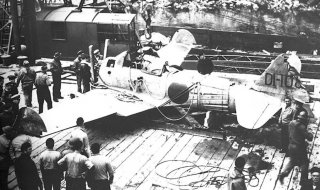World War II Forgotten Facts: How Imperial Japan Tried to Seize Alaska
The Japanese invasion led the U.S. military to forcibly evacuate more than 800 Aleut natives remaining on the other Aleutian islands to an internment camp in Juneau, Alaska.
As both sides could not call upon or carrier- or land-based warplanes, they fought one of the few long-range naval gunnery duels of World War II, exchanging hundreds of eight- and six-inch shells over ranges as high as 12 miles — including 800 eight-inch shells from the Salt Lake City alone. The American destroyers and one of the Japanese cruisers also darted closer to launch torpedoes, though none of them hit.
In the end, the American ships inflicted 14 casualties on the Japanese cruiser Nachi, but the Salt Lake City was nearly crippled with the loss of seven sailors after being struck in succession by six eight-inch shells from the Japanese heavy cruiser Maya. The weaker American force disengaged at noon under the cover of a smoke screen, while the Japanese also withdrew, fearing the arrival of U.S. air support.
As a consequence of the inconclusive skirmish, the Japanese Navy ceased sending surface ships to resupply the garrisons on Kiska and Attu, and switched to submarine-only deliveries. This drastically curtailed the supply situation on the Japanese-held islands, and the garrisons began to suffer from low morale and malnutrition.
By mid-1943, the fate of Japan’s Alaskan outpost was sealed. As the blockade and bombardment further intensified, the stage was set for Allied amphibious landings that would finally eject Japanese troops from U.S. soil. The landing on Attu in May 1943 would face three weeks of desperate fighting that culminated in a terrifying, desperate last act of resistance. And the joint American-Canadian assault on Kiska Island three months later would conclude in one of the most embarrassing surprises of the war.
This article originally appeared several years ago.
Image: Wikipedia.

